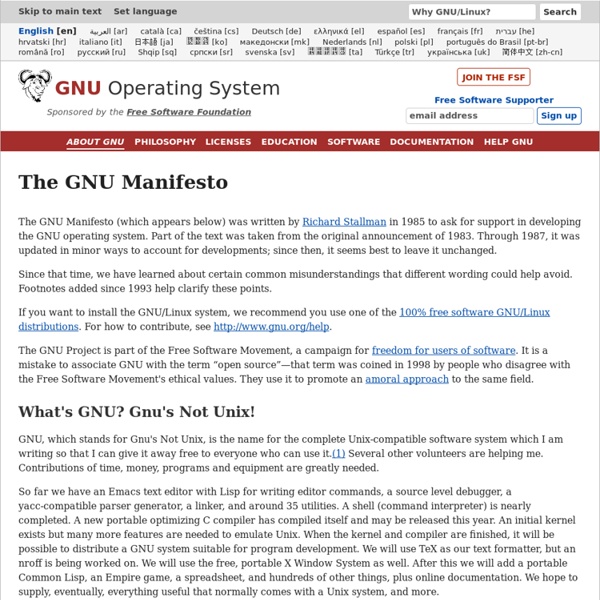Free software is a matter of liberty, not price
As our society grows more dependent on computers, the software we run is of critical importance to securing the future of a free society. Free software is about having control over the technology we use in our homes, schools and businesses, where computers work for our individual and communal benefit, not for proprietary software companies or governments who might seek to restrict and monitor us. The Free Software Foundation exclusively uses free software to perform its work. The Free Software Foundation is working to secure freedom for computer users by promoting the development and use of free (as in freedom) software and documentation—particularly the GNU operating system—and by campaigning against threats to computer user freedom like Digital Restrictions Management (DRM) and software patents. Our Core Work The FSF sponsors the GNU project—the ongoing effort to provide a complete operating system licensed as free software.
Guide rapide de la GPLv3 - Projet GNU - Free Software Foundation (FSF)
by Brett Smith [This article is also available in PDF and reStructuredText formats.] After a year and a half of public consultation, thousands of comments, and four drafts, version 3 of the GNU General Public License (GPLv3) was finally published on June 29, 2007. While there's been a lot of discussion about the license since the first draft appeared, not many people have talked about the benefits that it provides developers. We've published this guide to fill that gap.
Free Software Foundation Europe
Open Letter to EU institutions: Time to support Open Standards 26 March 2014: In an open letter to the European Parliament and the European Commission, Free Software Foundation Europe and Open Forum Europe are asking the European institutions to improve their support for Open Standards.
Pourquoi GNU/Linux ?
by Richard Stallman Names convey meanings; our choice of names determines the meaning of what we say. An inappropriate name gives people the wrong idea. A rose by any other name would smell as sweet—but if you call it a pen, people will be rather disappointed when they try to write with it. And if you call pens “roses”, people may not realize what they are good for.
What is Copyleft?
Copyleft is a general method for making a program (or other work) free, and requiring all modified and extended versions of the program to be free as well. The simplest way to make a program free software is to put it in the public domain, uncopyrighted. This allows people to share the program and their improvements, if they are so minded. But it also allows uncooperative people to convert the program into proprietary software.
Qu'est-ce que le logiciel libre ? - Projet GNU - Free Software Foundation (FSF)
The Free Software Definition Have a question about free software licensing not answered here? See our other licensing resources, and if necessary contact the FSF Compliance Lab at licensing@fsf.org. “Free software” means software that respects users' freedom and community. Roughly, it means that the users have the freedom to run, copy, distribute, study, change and improve the software. Thus, “free software” is a matter of liberty, not price.
Linux et GNU
by Richard Stallman Many computer users run a modified version of the GNU system every day, without realizing it. Through a peculiar turn of events, the version of GNU which is widely used today is often called “Linux”, and many of its users are not aware that it is basically the GNU system, developed by the GNU Project. There really is a Linux, and these people are using it, but it is just a part of the system they use. Linux is the kernel: the program in the system that allocates the machine's resources to the other programs that you run.
The Legacy of Linus Torvalds: Linux, Git, and One Giant Flamethrower
Linus Torvalds. Photo: Jon Snyder/Wired Linus Torvalds created Linux, which now runs vast swathes of the internet, including Google and Facebook.
Pourquoi l'« open source » passe à coté du problème que soulève le logiciel libre
by Richard Stallman When we call software “free,” we mean that it respects the users' essential freedoms: the freedom to run it, to study and change it, and to redistribute copies with or without changes. This is a matter of freedom, not price, so think of “free speech,” not “free beer.” These freedoms are vitally important. They are essential, not just for the individual users' sake, but for society as a whole because they promote social solidarity—that is, sharing and cooperation. They become even more important as our culture and life activities are increasingly digitized.




An amazingly powerfull paper, which influence goes far beyond programming and technology by Patrice Oct 11